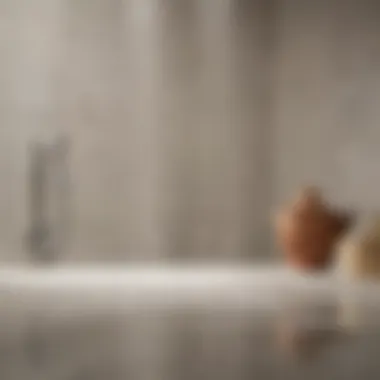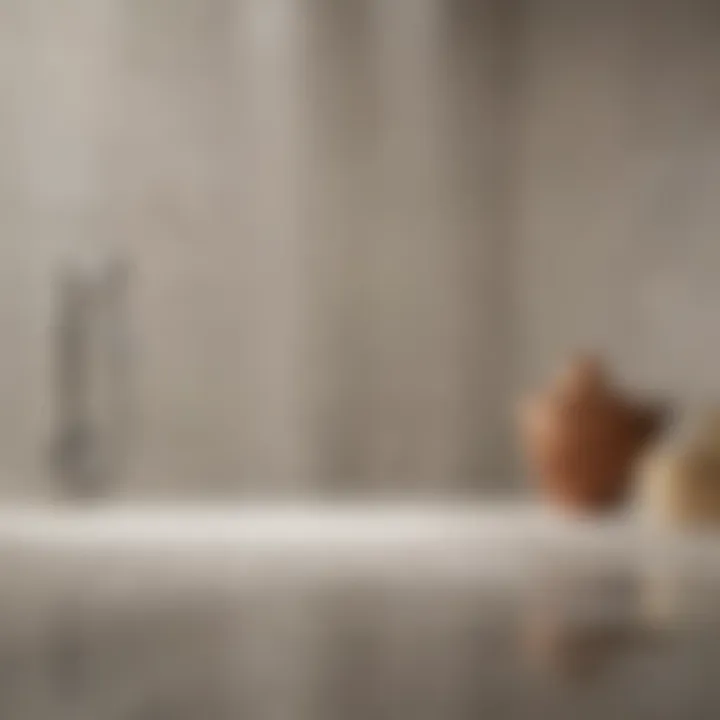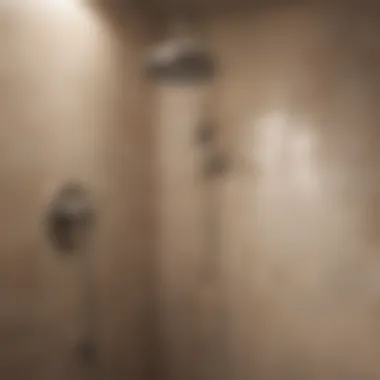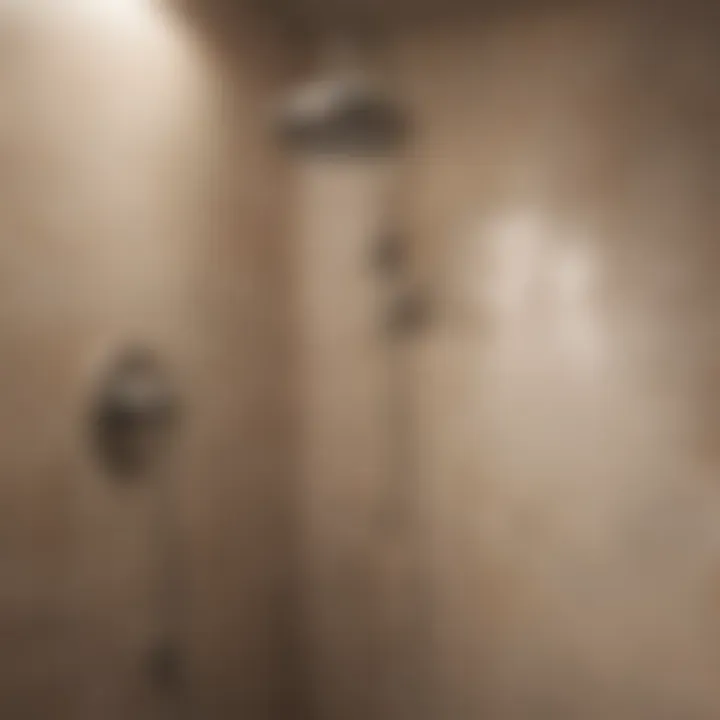Best Ways to Clean Showers: Expert Tips & Techniques


Intro
Keeping a shower clean is essential not only for aesthetics but also for hygiene. A clean shower enhances the overall experience of personal hygiene, making daily routines more pleasant. Furthermore, regular maintenance can prevent mold and mildew from taking hold, which can pose health risks and lead to costly repairs. The following sections will explore various effective methods to clean showers, ranging from traditional household products to modern cleaning innovations. This guide will also cover the challenges one may face during the cleaning process and offer practical tips to overcome them.
By understanding the most effective cleaning practices, readers will be equipped to combat soap scum, hard water stains, and grime that often accumulate in showers. With this knowledge, it is possible to create a hygienic and inviting shower environment.
Understanding Shower Cleaning
Cleaning showers is a task that many often overlook, but its importance cannot be understated. A clean shower is not just about aesthetics; it plays a crucial role in maintaining hygiene. Regular cleaning prevents the buildup of harmful bacteria, mold, and mildew, all of which can lead to health issues if left unchecked. When the shower is clean, it enhances the overall feel of the bathroom, making it a more inviting space.
Moreover, understanding the nuances of shower cleaning can save time and effort in the long run. Knowledge of the materials that make up your shower—be it tiles, glass, or fiberglass—can help determine the best cleaning techniques and products to use. This awareness leads to more effective cleaning, ultimately prolonging the lifespan of the shower fixtures.
The Importance of Cleaning Showers
Cleaning showers is essential for several reasons. First, it prevents the growth of mold and mildew, which thrive in damp environments and can pose serious health risks. Allergens and irritants often come from these sources, they can affect individuals with respiratory issues, leading to discomfort and health complications.
Second, a well-maintained shower surface ensures safety. Slippery surfaces caused by soap scum or grime can increase the risk of falls. Thus, a clean shower contributes not only to health but also to safety.
Finally, a clean shower improves the overall home environment. It creates a refreshing space that can enhance a person's mood and well-being. The benefits are clear: regular cleaning is not a chore but rather an investment in personal health and home maintenance.
Factors Contributing to Shower Grime
Several factors contribute to the buildup of grime in showers.
- Water Quality: Hard water contains minerals like calcium and magnesium, which can leave stubborn stains and deposits.
- Humidity Levels: Showers create a moist environment, perfect for mold and mildew growth. Higher humidity can increase grime buildup.
- Usage Frequency: The more often a shower is used, the more soap scum and other residues can accumulate.
- Anti-Mold Treatments: The lack of preventive measures, such as applying anti-mold solutions, makes it easier for grime to take hold.
Understanding these factors can empower individuals to take proactive steps in maintaining a cleaner shower. Knowing what contributes to dirt allows for tailored cleaning solutions and routines.
Common Shower Cleaning Challenges
Understanding the common challenges faced when cleaning showers is crucial for maintaining a hygienic and aesthetically pleasing bathroom. A clean shower enhances the overall look of your space while preventing issues that can arise from neglected maintenance. Familiarity with these challenges equips homeowners with the tools to tackle them effectively.
Hard Water Stains
Hard water stains can be a significant nuisance in any shower. These stains result from minerals like calcium and magnesium found in hard water. When hard water evaporates, it leaves behind a residue that clings stubbornly to surfaces, creating unsightly spots. Addressing hard water stains is essential for both aesthetic and maintenance reasons.
To mitigate this issue, regular cleaning is required. Vinegar or commercial hard water removers can effectively break down mineral buildup. For persistent stains, soaking affected areas with diluted vinegar for an extended period can yield better results. It is a good idea to consider installing a water softener system, which can drastically reduce hard water levels and prevent recurrence of staining.
Mold and Mildew Growth
Mold and mildew thrive in damp environments, making showers an ideal breeding ground. The presence of mold not only detracts from visual appeal but also poses health risks. Allergens and respiratory irritants are often linked to mold exposure, making it imperative to keep your shower area free from these fungi.
To combat mold and mildew, it is essential to ensure proper ventilation in your bathroom. Opening windows or utilizing an exhaust fan during and after showers can reduce moisture accumulation. Regular cleaning with antifungal solutions or a mixture of bleach and water can prevent mold growth. Pay close attention to caulking and grout lines, as they often harbor mold spores.
Soap Scum Buildup
Soap scum is another common challenge that many face in shower maintenance. It occurs when soap interacts with minerals in water, forming a sticky film. Soap scum not only makes surfaces look dirty but can also attract more grime and bacteria if not addressed.
Preventing soap scum buildup involves selecting the right kind of soap. Some body washes and shampoos are less prone to creating scum compared to traditional bar soaps. Regular cleaning is the best method to keep soap scum at bay. Using a mixture of vinegar, baking soda, or commercial cleaners designed for soap scum can facilitate removal.
In summary, these common shower cleaning challenges—hard water stains, mold and mildew growth, and soap scum buildup—demand attention and strategy. Through regular maintenance and the right cleaning supplies, these issues can be effectively managed to keep your shower clean and presentable.


Preparing for Shower Cleaning
Preparing for a shower cleaning process requires careful planning and execution. This stage is essential as it lays the groundwork for effective cleaning. By gathering the right supplies and considering safety elements, you can ensure a more efficient and thorough cleaning experience. Having a structured approach helps to avoid last-minute scrambles and enhances your overall efficiency and effectiveness.
Gathering Necessary Supplies
List of Traditional Cleaning Products
When it comes to cleaning showers, traditional cleaning products play a key role. Common items like bleach, vinegar, and ammonia are often used due to their potent cleaning capabilities. Bleach is especially effective for removing mold and mildew, while vinegar acts as a natural disinfectant. These products are popular choices because they deliver quick and visible results. However, caution is necessary. Traditional cleaners can be harsh and may cause irritation to skin or respiratory issues if not handled properly. It is crucial to read labels and follow instructions diligently to avoid mishaps.
Eco-Friendly Alternatives
The rise of eco-friendly alternatives marks a significant shift in modern cleaning. Products containing natural ingredients such as baking soda, lemon juice, and essential oils are gaining popularity. These combinations often provide a safer option, reducing environmental impacts while still being effective. One notable advantage of eco-friendly products is that they are less likely to irritate skin and are often safe to use around children and pets. However, while they may be less harsh, their effectiveness can vary based on the type of grime present. Thus, understanding their proper application is vital for success in your cleaning routine.
Safety Considerations
Personal Protective Equipment (PPE)
Using Personal Protective Equipment (PPE) is fundamental when cleaning showers. Key items include gloves, goggles, and masks. Gloves protect your hands from harsh chemicals, while goggles shield your eyes from splashes that could cause irritation. Masks can help minimize inhalation of fumes. Employing PPE not only adheres to safety measures but also enhances the comfort level during the cleaning process. Ignoring these precautions can lead to serious health risks, such as chemical burns or respiratory issues.
Ventilation Guidelines
Proper ventilation is critical when using cleaning products, particularly traditional ones that release strong fumes. Ensure windows are open and fans are running to circulate air effectively. This practice reduces the risk of inhaling harmful chemicals and helps maintain a safe cleaning environment. Additionally, it's advisable to take breaks in fresh air during the cleaning process if you start to feel lightheaded or dizzy. Strong odors can be overwhelming, and good ventilation allows for a more pleasant cleaning experience.
Proper preparation creates an atmosphere that is conducive to efficient and safe cleaning.
Best Practices for Cleaning Showers
Cleaning a shower effectively requires an understanding of various best practices. These methods not only ensure that the shower is hygienic but also prolong the life of the materials used. Having a consistent approach to cleaning helps prevent the buildup of grime, mold, and mineral deposits that affect both the appearance and functionality of the shower. Utilizing effective practices can save time and effort. Moreover, these methods often lead to a better overall experience when using the shower, as a clean space is more inviting and promotes healthier habits.
Cleaning Techniques for Different Surfaces
Tiles and Grout
Tiles and grout are commonly found in showers due to their durability and resistance to water. The porous nature of grout, however, makes it susceptible to stains and mildew. This characteristic necessitates careful attention when cleaning. A mixture of vinegar and baking soda can be effective, as it targets stains without damaging the tiles.
Tiles are easy to clean and maintain but can accumulate soap scum if not regularly treated. Many people prefer this combination for its effectiveness. However, frequent scrubbing may be required to avoid build-up, which can become a disadvantage.
Glass Shower Doors
Glass shower doors are popular for their aesthetic appeal, providing an open and airy feel. However, they can quickly show water spots and soap scum if not maintained properly. Using a squeegee after each shower can prevent buildup, making cleaning easier.
Cleaning the glass with a mixture of white vinegar and water can yield excellent results, restoring clarity and shine. Glass doors can look stunning when clean, but their transparency can make water stains more visible. Maintaining this surface often requires a dedicated approach, but the visual payoff is considerable.
Plastic and Fiberglass
Plastic and fiberglass shower units offer low maintenance and affordability. They resist mold and mildew well, making them a practical choice for many households. Cleaning them typically involves using a non-abrasive cleaner to prevent scratching the surface.
While they are durable, plastic and fiberglass can yellow over time or stain, especially if exposed to harsh chemicals. It is crucial to use the right products to maintain their appearance. The ease of cleaning plastic and fiberglass may be their biggest advantage, appealing to those looking to minimize maintenance efforts.
Step-by-Step Cleaning Process


Initial Rinse
Starting the cleaning process with an initial rinse is an essential step. Rinsing removes loose dirt and debris, allowing the cleaner to work more efficiently. This step helps to hydrate any remaining soap residue, making it easier to remove in subsequent steps.
The key characteristic of this phase is its simplicity; it requires no special products and can be done with just warm water. While some may consider it unnecessary, it sets the stage for a thorough clean, avoiding a situation where dirt is pushed around during scrubbing, which can complicate the cleaning process.
Application of Cleaner
Applying the cleaner is a critical part of the cleaning routine. Choosing the right cleaner involves factors such as the type of surface being cleaned and any existing buildup. For example, specialized cleaners for hard water stains may be required for specific types of surfaces.
This method allows the cleaner to sit for a while, especially in areas with significant buildup. This contact time enhances effectiveness by breaking down grime, making it easier to scrub away later. However, overuse of cleaning products can create residue, making it essential to follow instructions carefully.
Scrubbing and Rinsing
The scrubbing phase is where the most effort goes into cleaning. Using the appropriate tools, such as scrub brushes or sponges, is vital. Each surface may require a different type of tool to avoid damage while effectively removing stains.
Once scrubbing is completed, rinsing is crucial to ensure all cleaning residues are washed away. This method prevents the accumulation of new soap scum or dirt from sticking to the surfaces cleaned. A thorough rinse leaves surfaces sparkling clean but can be time-consuming if neglected regularly.
This process not only cleans but also contributes to the shiny clean look that one desires in a well-maintained shower.
Maintaining a Clean Shower
Maintaining a clean shower is crucial for both hygiene and longevity. Regular upkeep prevents the buildup of grime and mineral deposits, ensuring that the shower remains a pleasant space to step into. Neglecting maintenance can result in more serious issues, such as mold growth and hard water stains, which can be time-consuming and costly to remove. By implementing a routine for maintaining cleanliness, individuals can save time and effort in the long run while enjoying a healthier shower environment.
Regular Maintenance Routine
Daily Wipe Down
A daily wipe down is an effective measure to keep showers looking fresh. This simple practice involves using a cloth or squeegee to remove excess water from surfaces after each use. The key characteristic is its simplicity; it requires minimal time and effort to perform. Opting for a daily wipe down can prevent the accumulation of soap scum and hard water stains. Its unique feature lies in its ability to drastically reduce the frequency of deep cleaning sessions. However, it does require consistency and discipline, as skipping even a few days can lead to a buildup that becomes harder to manage.
Weekly Deep Cleaning
In contrast, a weekly deep cleaning is another essential part of the maintenance routine. This more thorough approach involves using appropriate cleaners and scrubbing surfaces, focusing on areas where grime tends to gather. The key characteristic is its comprehensive nature, addressing all surfaces in the shower. Weekly deep cleaning is beneficial as it tackles entrenched dirt and prevents long-term damage. It is a chance to use specialized products targeting mold, mildew, and soap scum. A potential disadvantage is that it may require more time and effort than a daily wipe down; therefore, scheduling this cleaning is important.
Using Preventative Measures
Water Softener Systems
Water softener systems play a vital role in maintaining a clean shower by reducing mineral content in water. The key characteristic is their ability to soften hard water, which is a prevalent issue in many areas. By installing a water softener, individuals can minimize the occurrence of hard water stains on shower surfaces. This is a beneficial choice as it can enhance not only the cleanliness of the shower but also the overall effectiveness of soaps and shampoos. The unique feature of these systems include their long-term benefits for plumbing and fixtures. On the downside, the initial installation cost can be high, and the systems require regular maintenance.
Anti-Mold Solutions
Implementing anti-mold solutions can significantly contribute to a clean shower environment. The key characteristic includes using specific products designed to inhibit mold growth on shower surfaces. Such solutions may involve sprays or special treatments added to the cleaning routine. This choice is valuable for anyone who has experienced mold problems in the past, offering peace of mind. The unique feature lies in their preventive capabilities, which protect against recurring mold issues. However, it’s worth noting that some anti-mold products may contain chemicals that require careful handling and consideration of overall health impacts.
Innovative Cleaning Solutions
Innovative cleaning solutions are transforming how we approach shower maintenance. As permanence in grime becomes an everyday struggle, many are turning to advanced tools and formulations to tackle the task more efficiently. Some of these innovations simplify the cleaning process and boost the overall effectiveness, making shower care a less time-consuming chore.
These new cleaning methods not only promise better results but also aim to address environmental concerns. Using safer materials and technologies minimizes negative impacts on both health and nature. Moreover, taking advantage of automation adds convenience and consistency to the cleaning process. In this section, we will explore two important innovations: automated cleaning devices and new cleaning formulations.
Automated Cleaning Devices


Automated cleaning devices offer a modern alternative to traditional shower cleaning methods. These devices often include robotic systems designed to scrub surfaces efficiently. For example, robotic cleaners can navigate around the corners and curves of shower spaces, simulating manual scrubbing while saving time.
Benefits of using automated devices include:
- Consistency: Robots clean at regular intervals, ensuring no area is neglected.
- Reduced Physical Effort: Users can minimize the strain associated with bending and scrubbing.
- Advanced Technology: Many devices feature timers and sensors that allow them to operate autonomously.
However, consumers should consider factors like the size of their shower’s layout. Some devices may not fit easily in all sizes. Also, regular maintenance of the automations is necessary to ensure their longevity and performance.
New Cleaning Formulations
With increasing awareness of environmental issues, new cleaning formulations are gaining popularity. These products often focus on non-toxic and biodegradable ingredients. Modern formulations work on a molecular level, breaking down stains and grime effectively without harsh chemicals.
Key features of these new cleaning solutions include:
- Eco-Friendly Ingredients: Many brands prioritize sustainability in their product lines, appealing to environmentally-conscious consumers.
- Efficiency: Advanced formulations demand less scrubbing compared to traditional counterparts, streamlining the cleaning sessions.
- Versatility: Several new products are effective across different surfaces, adapting well to tiles, glass, and plastic materials.
Embracing these innovative solutions not only leads to cleaner showers but also supports a healthier home environment. As technology progresses, the options for effective cleaning will continue to grow, offering better performance and ease of use.
Evaluating Cleaning Results
Evaluating the results of your cleaning efforts is crucial in maintaining a hygienic shower environment. This process allows you to determine the effectiveness of the methods you have employed. A well-evaluated cleaning not only ensures that your shower remains visually appealing but also promotes health by minimizing the risk of mold or bacteria growth. When you assess the cleanliness levels regularly, you can adapt your cleaning techniques, ensuring that they are tailored to your specific space.
Assessing Cleanliness Levels
To accurately assess how clean your shower is, consider the following factors:
- Visual Inspection: Look for any remaining stains, soap scum, or mildew. An initial glance can often reveal what needs further cleaning.
- Surface Touch Test: Run your hand over surfaces. If you feel any stickiness or rough texture, these could be indicators of leftover cleaning agents or grime that needs addressing.
- Odor Evaluation: A fresh-smelling shower is a sign of good cleaning practices. If you detect musty or unpleasant smells, this suggests that mold or mildew may still be present.
Regular inspections can help maintain a high standard of cleanliness. Analyzing these factors can guide your cleaning routine effectively.
Identifying Areas for Improvement
Once you have assessed the cleanliness levels, it’s vital to identify areas needing improvement. This may include:
- Focus Areas: Check corners, grout lines, and behind fixtures where dirt tends to accumulate more.
- Frequency Adjustment: If certain areas accumulate grime quickly, you might need to adjust your cleaning frequency.
- Technique Review: Sometimes a different cleaning method may yield better results. Experiment with various products or tools.
Asking for feedback from household members can also provide insight into other areas that need attention.
"The act of evaluating is as crucial as the act of cleaning itself. Continuous improvement leads to a more sanitary and enjoyable shower experience."
Bear in mind that maintaining a clean shower is an ongoing effort. Regular evaluations allow you to adapt and refine your cleaning strategies, leading to a consistently fresh and inviting shower space.
The End
In this article, we explored various aspects of shower cleaning, emphasizing both best practices and innovative solutions. The conclusion serves as a vital summary, reinforcing the significance of maintaining a clean shower space. A clean shower not only enhances the aesthetic appeal of your bathroom but also contributes to health by reducing the risk of mold and bacteria proliferation.
Recap of Cleaning Techniques
- Surface-Specific Methods: Different shower materials require tailored approaches. For instance, tiles and grout often need a stronger detergent, while glass doors benefit from vinegar-based solutions to avoid streaks.
- Frequency of Cleaning: Regular maintenance plays a critical role. A quick daily wipe can prevent soap scum and hard water stains from becoming ingrained.
- Application of Eco-Friendly Products: Incorporating natural cleaning solutions, such as baking soda or vinegar, can effectively clean while being safe for the environment.
"A clean shower is the first step towards a healthier lifestyle."
Final Recommendations
To keep your shower in top condition:
- Establish a routine for cleaning. Decide on a deep clean weekly, supplemented by quick daily maintenance.
- Invest in high-quality cleaning tools. A good scrub brush and a squeegee for glass surfaces can make a significant difference.
- Consider preventative measures. Utilizing a water softener can reduce the occurrence of hard water stains, while anti-mold sprays can inhibit growth in humid areas.
By following these recommendations, you will not only enjoy a visually appealing shower but will also foster an environment that promotes wellness and hygiene.







